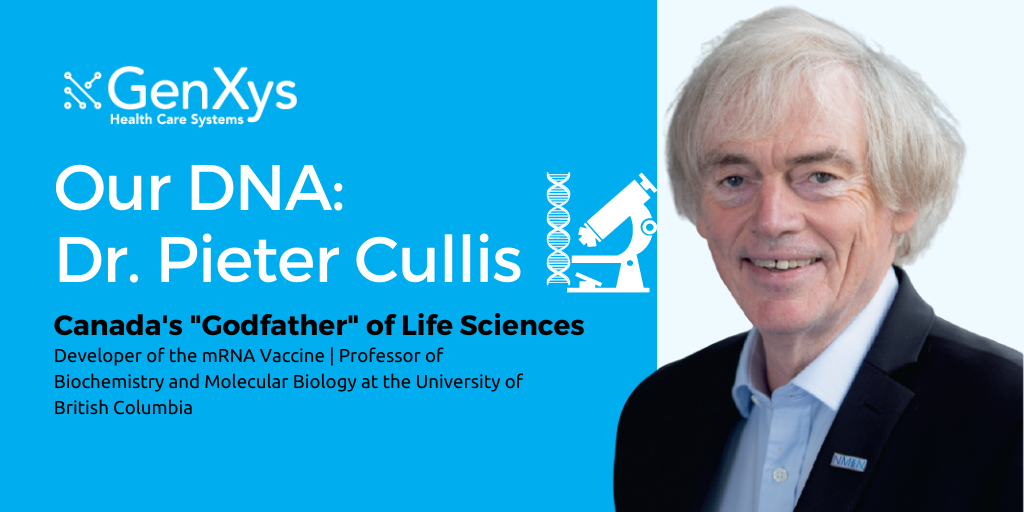Top Five Questions and Answers from Canada’s ‘Godfather’ of Life Sciences, Dr. Pieter Cullis
You’ve been on the cutting edge of life sciences for many years in taking the ‘lab to the bedside’ to improve health – can you tell us a little bit about the opportunities that you are most proud about or have the biggest potential impact on society?
I’ve been in this industry for about 40 years and the evolution has been fascinating. We started looking at personalized medicine for cancer therapies in the 1980s and the progression has been remarkable. The way that I have advanced personalized medicine has been through spinning out companies focused on developing personalized approaches to medicine. I was involved with Martin Dawes, (current Chief Scientific Officer & Founder) in the early days of GenXys and the current direction parallels my vision for truly personalized medicine.
The biggest impact, however, that I feel I have had is in the Covid-19 vaccine space. It was a bit of a non-linear track to get there, but much of my work on delivery systems has led to systems that enable messenger ribonucleic acid (mRNA) to be used for vaccines. And the foundational work, much of it done right here in BC by companies like Acuitas and Precision NanoSystems, enabled partners such as Pfizer and BioNTech to develop Covid-19 vaccines quickly and effectively.
What lessons has the pandemic taught us that we can apply to the role of genetics in vaccines, and other types of drug therapy?
What we learned from the pandemic is that we are entering the personalized medicine revolution. We have been able to develop highly potent medicines- once the genome of the virus was analyzed, a feat that took only days, the mRNA vaccine was ready in just a few months. The speed at which this was accomplished is spectacular.
I really think that we are close to an era where we can truly personalize medicine for individuals and I actually mean make them for each person. mRNA has huge potential to become the basis of the next generation of drug therapies. And this fits in well with the work being done by GenXys and its current clinical decision support platform.
You were a founding father of GenXys, which has now become a well-known leader in enabling pharmacogenetic data to be a seamless part of a health care providers prescribing. What is your perspective on the role of pharmacogenetics in healthcare? And how does and how does it align with GenXys’ vision of having every prescription globally made better by its software?
If there is a low-hanging fruit in personalized medicine this has to be it. We are killing people right now because we are giving them the wrong medications, and we are giving them too many. GenXys isn’t just looking at a subset of genetic information, we are integrating this information with other drugs the patient may be taking to avoid adverse reaction due to drug-drug and drug-gene interactions.
Most adverse drug reactions (ADRs) aren’t even reported and we already know that is it the fourth leading cause of death in the western world. One of my biggest concerns is also overprescribing, especially in seniors. We need to de-prescribe drugs that are no longer needed.
How have advances in genetics and genomics propelled (or primed to propel) precision medicine into the mainstream?
When we talk about precision medicine we are dealing with the art of the possible. Until now we have not been able to produce truly personalized drugs because it is cost and time prohibitive. However, mRNA therapeutics that are highly personalized can be developed very quickly to treat many diseases. And the cost isn’t out of hand. People are now much more knowledgeable about the role genetics can have on their health and are asking their health care providers about its relevancy to their specific health needs.
What are the biggest hurdles left to overcome to bring precision medicine to fruition?
There are many hurdles. If we focus on cancer as an example, each individual’s cancer can be quite different. Present medicines focus on common mutations but most people don’t benefit. I think we’re going to get some really personalized approaches in the near future using mRNA therapeutics to produce an immune response that is specific to a patient’s tumour, for example. I’m optimistic that things will happen faster but there still is a significant regulatory piece to overcome. Also, people can react negatively to new medicines; look at the resistance by certain folks to the speed at which the Covid-19 vaccine came through.
What I can say, though, is that current medicine approaches aren’t working that well, particularly for older people. So that’s where we need to focus our efforts. How can we treat aging as a phenomenon in itself to reduce the diseases associated with old age? Is there a role for RNA-based therapies for preventive, rather than reactive interventions? There’s a big role for GenXys and their digital automation solutions with embedded pharmacogenetics to play in supporting appropriate prescribing as well. I can’t wait to see where things go.
